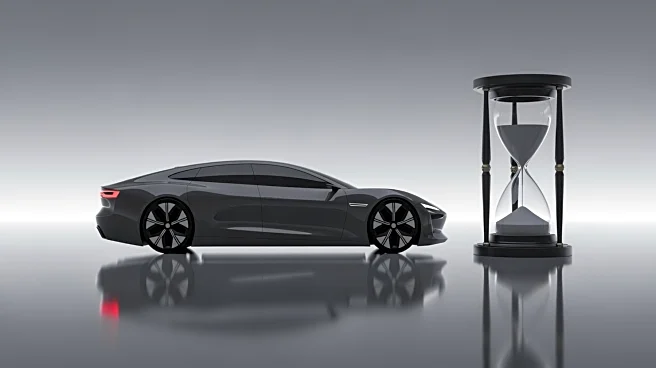What's Happening?
Rivian, an American electric vehicle manufacturer, has announced plans to lay off approximately 4% of its workforce as it prepares for the launch of its new R2 model in 2026. The decision, detailed in a letter
from CEO RJ Scaringe, is part of a strategic move to streamline operations and ensure a profitable scale-up of the business. The layoffs, affecting around 600 employees, are intended to conserve cash and optimize the company's go-to-market functions. Rivian aims to integrate its Vehicle Operations workstreams into the Service organization and consolidate its Delivery and Mobile Operations into the Sales organization to enhance customer experience. Additionally, Rivian is forming a single marketing organization, with Scaringe temporarily acting as Interim Chief Marketing Officer. Despite the challenging market conditions following the end of the federal tax incentive, Rivian's Q3 2025 deliveries exceeded expectations, indicating strong performance.
Why It's Important?
The workforce reduction at Rivian highlights the challenges faced by EV manufacturers in a competitive market, especially after the expiration of federal tax incentives. By streamlining operations and focusing on efficient scaling, Rivian aims to position itself for success with the upcoming R2 model, which is anticipated to be a significant player in the EV industry. The layoffs reflect a strategic approach to managing resources and optimizing business functions, which could set a precedent for other automakers facing similar market pressures. The move also underscores the importance of operational efficiency and customer experience in maintaining competitiveness in the rapidly evolving EV sector.
What's Next?
Rivian is expected to continue refining its operational strategies as it approaches the launch of the R2 model in 2026. The company may further adjust its workforce and business functions to align with market demands and ensure a successful product launch. Stakeholders, including employees and investors, will be closely monitoring Rivian's progress and any additional announcements regarding its strategic plans. The integration of marketing and sales functions could lead to improved customer engagement and brand positioning, potentially boosting sales and market share once the R2 model is released.
Beyond the Headlines
The decision to lay off staff and restructure operations at Rivian may have broader implications for the EV industry, highlighting the need for companies to adapt to changing market conditions and consumer expectations. The focus on customer experience and streamlined operations could influence industry standards, encouraging other automakers to prioritize similar strategies. Additionally, the move may prompt discussions on the sustainability of workforce management practices in the tech-driven automotive sector, as companies balance innovation with operational efficiency.










